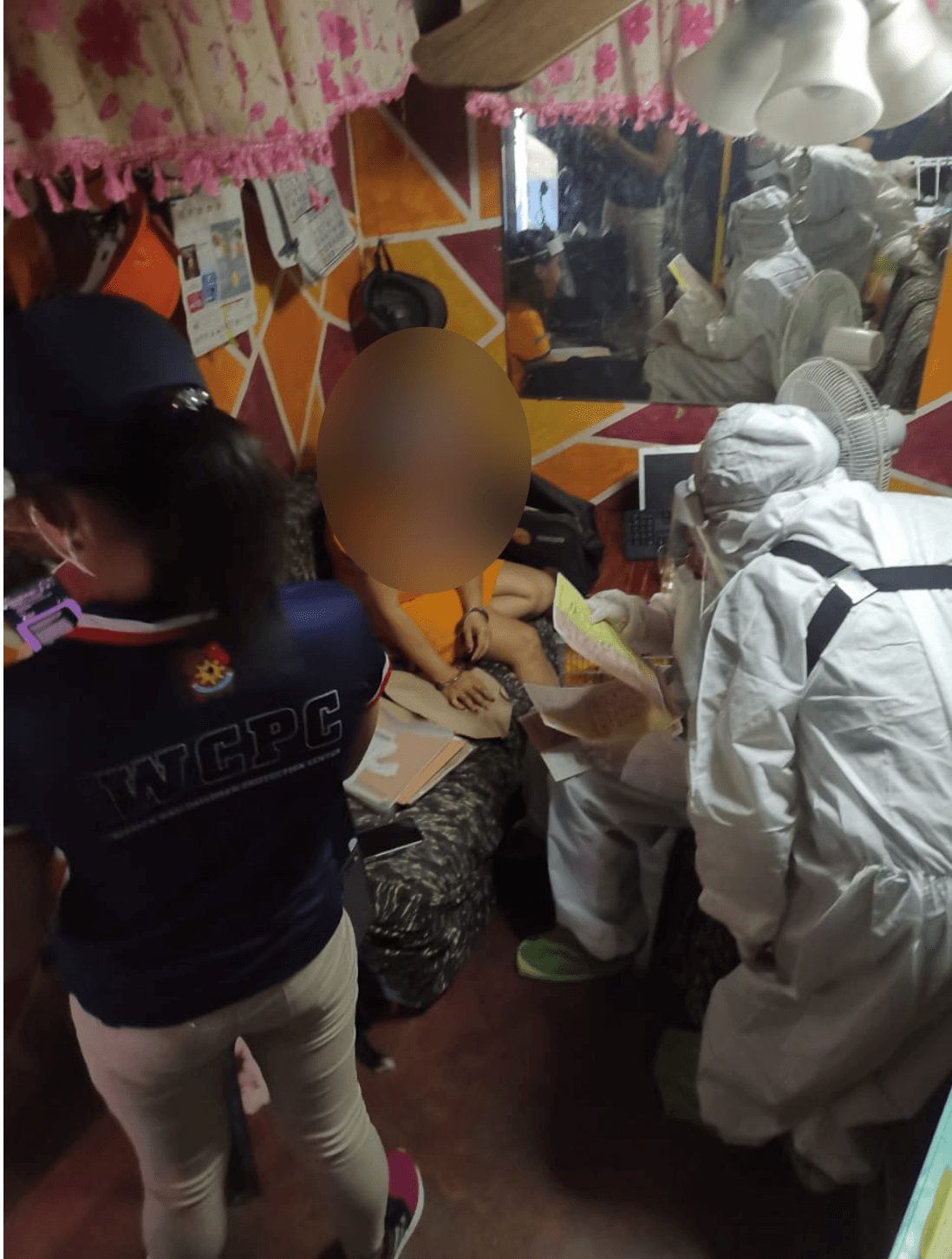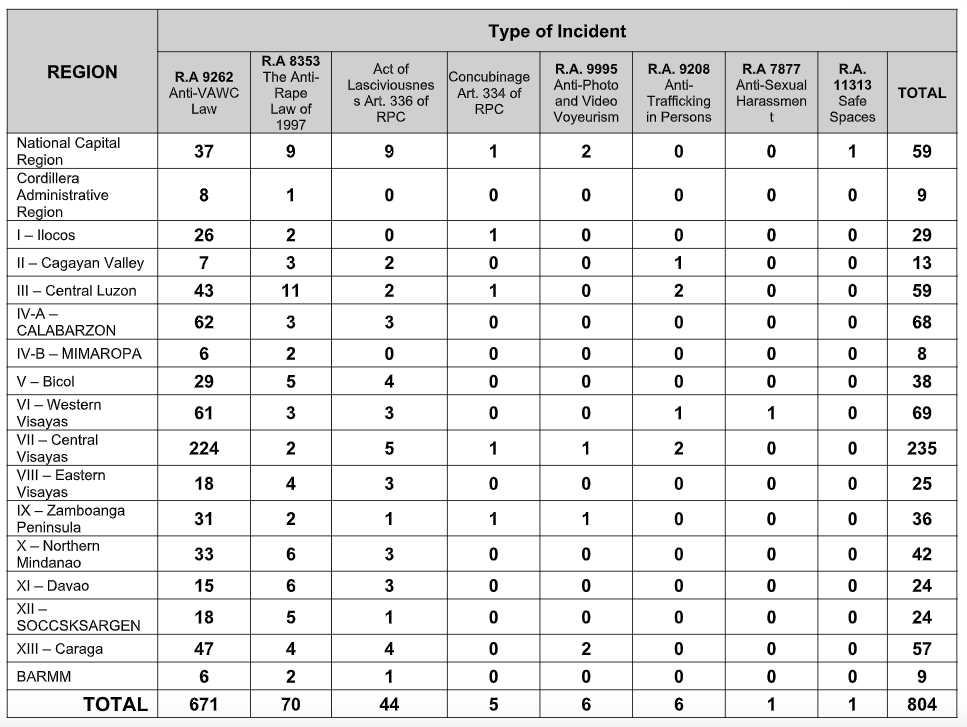SUMMARY
This is AI generated summarization, which may have errors. For context, always refer to the full article.

MANILA, Philippines – The scene of the crime was a narrow sala, walls painted in shards of orange, yellow, and maroon.
In any other home in locked-down Caloocan City, it would have been the setting for a family’s endless afternoons watching television. Or evenings on the karaoke machine, blasting sappy ballads until the neighbors complained.
But this sala had no TV or sing-along machine. What it had was a desktop computer, a mobile phone, and remittance receipts from Australia. In this sala, a 41-year-old woman was arrested for forcing her 3 kids to perform sexual acts on camera.
The youngest victim was a 5-year-old girl.
Somewhere else in an undisclosed province in locked-down Luzon, a yellow house hid a similar horror – a 25-year-old woman making 7 kids do lewd acts in front of a webcam. Four of the kids were her own children. The youngest victim was just 3 years old.

These are just two cases of sexual abuse reported to authorities during the coronavirus lockdown imposed in Luzon since March 17.
Watchdog groups had warned of an increase in such incidents because stay-at-home measures are locking in victims with their abusers. But government data shows that the number of cases of gender-based abuse and violence reported to authorities declined during the first month and a half of coronavirus lockdown measures.
The figures could mean a reduced prevalence of abuse, but it could also point to something even more worrisome: victims simply unable to report abuse, partly due to the quarantine measures themselves. (READ: [OPINION: Dash of SAS: How do you stay at home when home is a dangerous place?)
The quarantine measures likely breed situations that make it more difficult for a victim-survivor to report crimes.
The Philippine Commission on Women (PCW) said they could be discouraged by “limited mobility and the absence of public transportation” in areas where this has been suspended to curb the spread of the coronavirus.
Victim behavior
Being constantly in the presence of abusers due to strict stay-at-home orders may also make victims scared of reporting violence.
“Women and children who experience abuse are trapped inside their homes with their abusers, and have nowhere to go. Most of these women are not able to seek help because they fear being overheard by their abusive partners or are stopped from leaving home,” said the Commission on Human Rights in a statement on April 5.
This only aggravates the already low help-seeking behavior of Filipino women even before the COVID-19 pandemic.
Only one in 3 Filipinas who have experienced physical or sexual violence sought help to stop the abuse, according to the 2017 National Demographic and Health Survey conducted by the Philippine Statistics Authority.
Women are also more likely to seek help from their own family (65% of women respondents) or a friend (18%), based on the same survey.
What the data says
Data from the PCW obtained by Rappler shows that 804 incidents of gender-based violence and violence against women and children were reported from March 15 to April 30 – the period when Luzon and other parts of the country were on lockdown. The number was taken by PCW from the Philippine National Police’s Women Children Protection Center (PNP-WCPC).
March 15 was the first day of the Metro Manila lockdown, quickly followed by the Luzon-wide lockwide declared on March 17. The lockdowns were supposed to end on April 30 but were extended until May 15 for the megacity and other parts of Luzon. Cities and provinces outside of Luzon had also declared their own lockdowns during this period.
The 804 reported cases come from all over the country, pertaining to violations of 8 laws – anti-violence against women and children law, anti-rape law, revised penal code provisions against acts of lasciviousness and concubinage, anti-photo and video voyeurism law, anti-trafficking persons law, anti-sexual harassment law, and the safe spaces law.
The number of reported cases during lockdown was lower than the number of cases reported in the previous months. However, the cases were already on a downward trajectory during these months.
In January 2020, there were 1,383 reported cases nationwide. In February, it went down to 1,224. For March, the figure dipped further to 1,044.
In the graph below, hover over the lines and points to see the figures.
For a better view of this graph, go here.
Despite the downward trajectory in the months before the lockdown, women’s and children’s rights groups warned of an uptick in abuse during the lockdown because of the stay-at-home measures.
This makes the lower number of cases during lockdown worth investigating.
TABLE: Reported incidents of gender-based violence during lockdown (March 15 to April 30, 2020)

Meanwhile, the PNP has recorded 763 cases of crimes against women, and 521 cases of crimes against children, according to Malacañang’s 6th coronavirus report to Congress.
Stretched thin
It’s tricky to postulate why the number of reported gender-based abuses went down during the weeks of the lockdown period.
But gender rights watchdog groups do say that the coronavirus pandemic may have an impact in two ways: government personnel and resources are stretched thin and lockdown measures are breeding grounds for situations that discourage victims from reporting abuse.
Kathy del Socorro of Gender Watch Against Violence and Exploitation (GWAVE) said reporting such incidents to the government hasn’t been the same since the quarantine measures were put in place.
Her group, based in Dumaguete City which had its own lockdown starting April 3, provides legal assistance to abused women. They typically coordinate with barangays and the Department of Social Welfare and Development (DSWD).
“It’s been difficult to get hold of these people and really push them to issue a barangay protection order immediately as compared to when there was no COVID-19,” she told Rappler in a phone interview.
The barangays are still able to release the protection orders on time or within 24 hours, but not as speedily as in the past, she said. However, she clarified these were only for a few cases and it isn’t prudent to make any generalizations based on them.
The same is true for local DSWD and women and children protection desks.
“Because they are more focused on the COVID-19 issue, the level of cooperation you get from them is not the same, which is quite understandable,” said Del Socorro.
The issue may be the lack of manpower, she surmised. While cities could have 20 or more social workers able to delegate various tasks among themselves, some municipalities have only one social worker. With the pandemic, it’s not surprising their plates are full.
PCW itself said in an email to Rappler that “disrupted public services like police, justice and social services” could contribute to lower reports of abuse.
GWAVE also encountered more difficulty in filing legal cases against perpetrators of abuse. While the judiciary has enabled online filing, Del Socorro said the process takes longer.
The delays could greatly affect the case since it could give time for the accused to leave or pressure the victim into not pushing through with the case.
Recent complaints
GWAVE itself has received 35 complaints of abuse during the lockdown period (March 17 to April 29) from calls, texts, and Facebook messages. Most of these are complaints of economic abuse, or acts that make or attempt to make a woman financially dependent.
The women told GWAVE that their partners refuse to provide financial support to the family, saying they have no money because of the lockdown’s impact on their jobs.
There were also 5 cases of sexual abuse of children, including a case of incest, when two kids were molested by a close family member living in the same house.
Senator Risa Hontiveros has urged the PNP and PCW to strengthen anti-domestic violence measures.
“The lockdown should not allow us to become lax in securing the safety of women and children… The challenge now is to make sure that channels are open and are readily available to victims of domestic violence,” said Hontiveros.
Government promise
Despite the pandemic, the government has vowed no let-up in its efforts to help victims of gender-based abuse. This was mentioned in no less than President Rodrigo Duterte’s reports to Congress about the pandemic.
The April 13 report says the Department of the Interior and Local Government issued an advisory that “all Barangay Violence Against Women Desks and Barangay Council for the Protection of the Children shall remain active and fully functional during the ECQ.”
Duterte also gave assurances the DILG and PCW are “continuously monitoring and actively responding” to inquiries and reports on abuses.
Who to call?
Watchdogs and government agencies encourage anyone suffering from gender-based abuse to report the crime, even during lockdown.
The CHR launched a platform for reporting gender-based violence online.
PCW said the government’s referral services continue to take calls. Phone services are especially emphasized precisely because of the quarantine measures.
“In times of crisis, a remote VAW service provision via phone is extremely important considering the limited movement of people,” said the Commission.
Its Violence Against Women Referral Service has been working “pretty well” with the PNP’s Women and Children Protection Center and barangay officials, it said.
Below is the list of ways to reach authorities when reporting gender-based abuse:
POLICE/INVESTIGATION ASSISTANCE
- PNP Hotline: 177
- Aleng Pulis Hotline: 09197777377
- PNP Women and Children Protection Center
- 24/7 AVAWCD Office: (02) 8532-6690
- Email address: wcpc_pnp@yahoo.com / wcpc_vawcd@yahoo.com / avawcd.wcpc@pnp.gov.ph
LEGAL ASSISTANCE: Public Attorney’s Office
- Hotline: (02) 8929-9436 local 106, 107, or 159 (local “0” for operator)
- (+62) 9393233665
- Email address: pao_executive@yahoo.com
REFERRAL SERVICES: Inter-Agency Council on Violence Against Women and their Children
- Mobile numbers: 09178671907 / 09178748961
- Email address: iacvawc@pcw.gov.ph
– with reports from Michelle Abad/Rappler.com
Add a comment
How does this make you feel?

There are no comments yet. Add your comment to start the conversation.